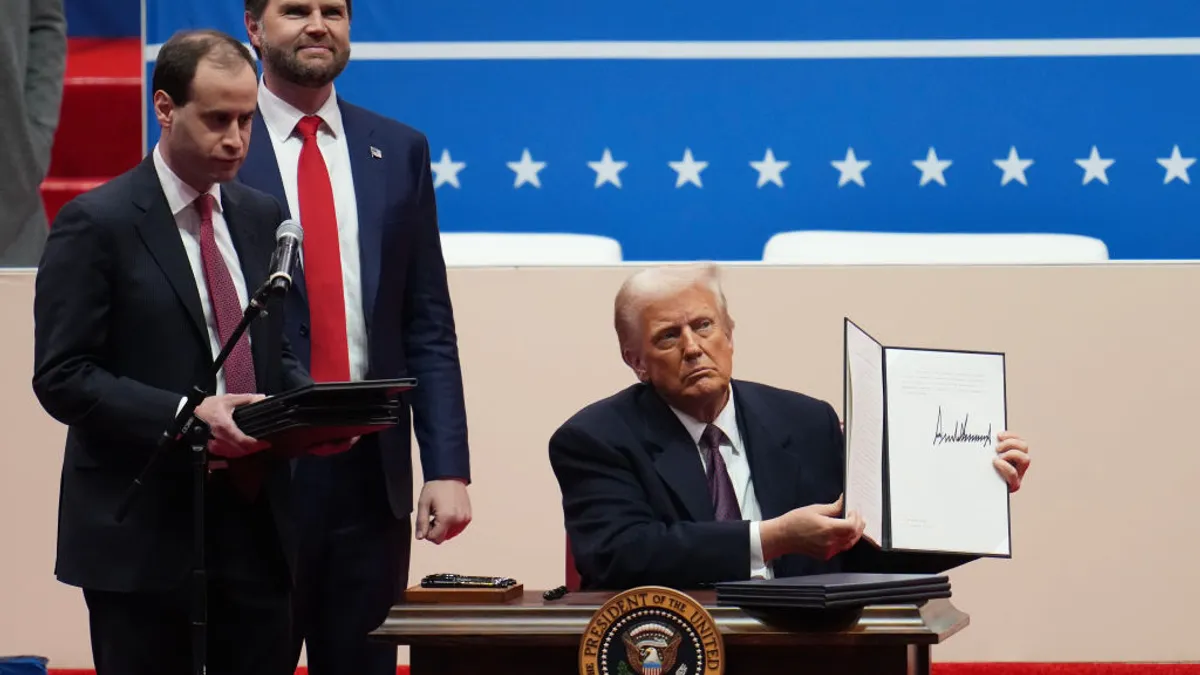Since taking office, President Donald Trump has signed a cascade of executive orders with big implications for labor, permitting, project funding and other critical issues for contractors.
This means the legal landscape is highly uncertain, and contractors and their clients must remain nimble and up to speed on policy changes, according to a Jan. 29 client advisory from Washington, D.C.-based law firm Arnold & Porter.
“The Trump administration’s early issuance of numerous new policies requires organizations to carefully self-audit existing programs, monitor for new agency guidance, review the terms of existing grants and other financial assistance agreements, keep a record of costs, and remain in compliance with new contractual terms,” according to Arnold & Porter experts.
On Jan. 20, President Donald Trump told federal agencies to stop disbursing Infrastructure Investment and Jobs Act and Inflation Reduction Act funding, throwing those projects into limbo. The “Unleashing American Energy” directive’s precise implications may not be fully understood for months, and while it seems to target electric vehicles and certain energy efforts, the uncertainty itself is likely to disrupt infrastructure and climate projects, experts say.
The executive order also cut back the White House’s National Environmental Policy Act rulemaking powers and aims to speed up permits for energy infrastructure projects powered by oil, gas, nuclear, coal, hydropower and biofuel.
That same day, Trump also signed several orders aimed at eliminating diversity, equity and inclusion priorities of the federal government set by former President Joe Biden. On Jan. 21, he rescinded an executive order issued by President Lyndon Johnson in 1965 during the Civil Rights Movement to ban discrimination in federal contracts. In yet another order, Trump extended that anti-DEI focus to include private businesses, directing agencies to “encourage the private sector to end illegal discrimination and preferences, including DEI.”
As Trump’s agenda regarding federal contracts and grants continues to rapidly evolve, there are ways that contractors can protect themselves.
Civil project freeze scope still unclear
A Jan. 21 memo from the Office of Management and Budget said the directive to halt IIJA and IRA projects is limited to programs that Trump has termed part of a “Green New Deal,” but business and government leaders are seeking clarity on exactly what that means.
Members of Congress sent a letter on Jan. 27 asking the administration to provide an itemized list of programs and projects that have been put on hold, noting the order “is a source of great anxiety for communities and businesses across the country that use this funding to build new roads, fix bridges, replace lead pipes, expand broadband access, strengthen infrastructure against natural disasters, and much more.” So far, the administration has not responded.
“As a businessman, President Trump ought to know that delaying an ongoing construction project comes at an immense dollar price,” the letter reads.
That lack of clarity may lead some cities and states to pause or review certain projects to avoid taking on costs they expected to be covered by federal grants, Smart Cities Dive reported. For example, Nevada Democrats expressed concern about the order’s possible impact on solar and wind farms and the Brightline West high-speed rail project, while a separate Jan. 20 executive order took aim at wind power across the country.
Regardless of how the order eventually shakes out, any disruption in funding could have immediate effects on contractors engaged on IIJA and IRA projects, and may lead to project delays and terminations, according to Washington, D.C.-based law firm Crowell.
“Disruptions in cash flow to these projects will create uncertainty and raise several potential impacts,” per Crowell, including project delays and cancellations, various legal and contractual issues and continuing payment obligations despite the funding freeze.
What civil contractors must know
In some cases, contracts or grants may be terminated if they are not aligned with the new administration’s priorities, Daniel Ramish, partner at Dallas-based law firm Haynes Boone, said in an email.
“In that scenario, recipients and contractors should consult with counsel about their legal rights,” Ramish said. “Construction contractors will also need to review and make changes to their compliance programs based on new presidential directives.”
Federal contractors should also be aware that the scope of Trump’s orders — and agencies’ attempted implementation of them — will initially present a legal gray area that is subject to interpretation, according to Arnold & Porter.
“All those accepting federal financial assistance should be thoughtful and deliberate when responding to agency certification requests, especially when they are being asked to certify compliance with nebulous or undefined terms,” per Arnold & Porter.
Depending on agreement terms, subcontractors and suppliers may demand continued payments amid a funding suspension, according to Arnold & Porter. It’s important to promptly review any stop work orders, communicate with subs and keep track of any associated costs.
“To prepare for any potential claims, grantees should carefully track and account for any costs incurred following the stop work order or termination. This accounting can be provided to legal counsel in support of the preparation of a claim,” according to Arnold & Porter.
Construction firms will also need to update their compliance programs based on new presidential directives, such as those pertaining to affirmative action, Ramish said.
Trump’s Jan. 21 “Ending Illegal Discrimination and Restoring Merit-Based Opportunity” order revoked the underlying legal authority for general affirmative action requirements on federal contracts and federally assisted construction contracts, Ramish said. Statutory requirements pertaining to veterans and people with disabilities remain in effect.
The order also directs that DEI and affirmative action programs comply with “all applicable Federal anti-discrimination laws,” requiring contractors and recipients to certify to their compliance via new contract clauses, according to Ramish.
“The certification requirement is framed so as to signal to contractors that the administration may enforce the new requirements under the False Claims Act,” said Ramish. “Contractors will need to review their affirmative action programs to ensure compliance with these new legal directives.





















